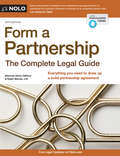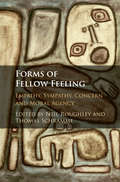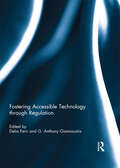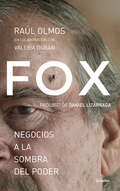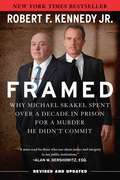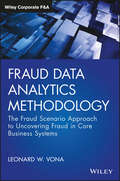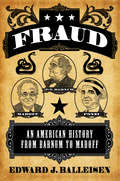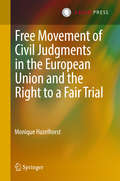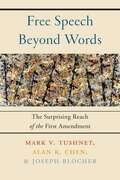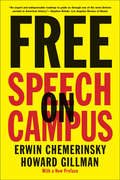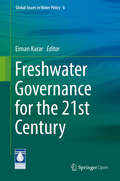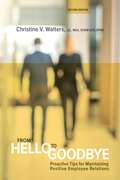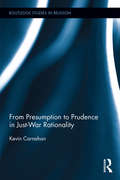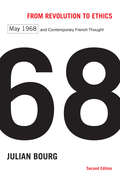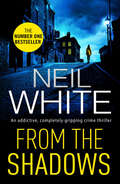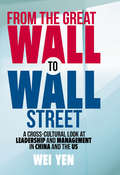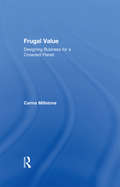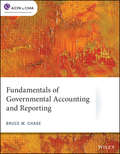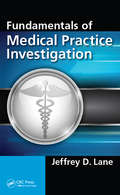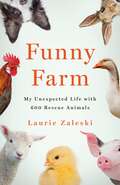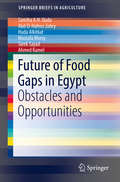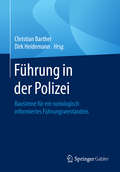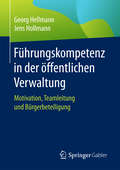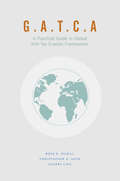- Table View
- List View
Form a Partnership: The Complete Legal Guide
by Ralph Warner Denis CliffordEverything you and your partners need to go into business together! Form a Partnership thoroughly explains the legal and practical issues involved in forming a business partnership, creating a partnership agreement and protecting each person's interests. In plain English, the book covers: partnerships compared to other business structures the financial and tax liability of partners contributions of cash, property and services what happens if a partner wants out how to value partnership assets admitting new partners buying out a partner's interest limited partnerships and much more. This edition of Form a Partnership is totally revised and updated to reflect the law and realities of today's business world. Plus, all the forms you need to create a partnership agreement are provided.
Forms of Fellow Feeling
by Neil Roughley Thomas SchrammeWhat is the basis of our capacity to act morally? This is a question that has been discussed for millennia, with philosophical debate typically distinguishing two sources of morality: reason and sentiment. This collection aims to shed light on whether the human capacity to feel for others really is central for morality and, if so, in what way. To tackle these questions, the authors discuss how fellow feeling is to be understood: its structure, content and empirical conditions. Also discussed are the exact roles that relevant psychological features - specifically: empathy, sympathy and concern - may play within morality. The collection is unique in bringing together the key participants in the various discussions of the relation of fellow feeling to moral norms, moral concepts and moral agency. By integrating conceptually sophisticated and empirically informed perspectives, Forms of Fellow Feeling will appeal to readers from philosophy, psychology, sociology and cultural studies.
Fostering Accessible Technology through Regulation
by Delia Ferri and G. Anthony GiannoumisTechnology has attracted an increasing level of attention within studies of disability and disability rights. Many researchers and advocates have maintained skepticism towards technology out of the fear that technology becomes another way to ‘fix’ impairments. These skeptical views, however, contrast with a more positive approach towards the role that technology can play in eliminating barriers to social participation. Legal scholarship has started to focus on accessibility and accessible technology and in conjunction with the recently adopted United Nations Convention on the Rights of Persons with Disabilities has put a great emphasis on accessibility, highlighting the role that accessible technology plays in the promotion and protection of the rights of people with disabilities. Against this background, this book gathers together different contributions that focus on enhancing the production, marketing and use of accessible technology. Building upon previous academic studies and in light of the UNCRPD, accessible technology is considered a tool to increase autonomy and participation. Overall, this book attempts to show, through a multifaceted and inter-disciplinary analysis, that different regulatory approaches might enhance accessible technology and its availability. This title was previously published as a special issue of the International Review of Law, Computers & Technology.
Fox: negocios a la sombra del poder
by Raúl Olmos Valeria DuránUn libro explosivo de periodismo de denuncia que revela los negocios de un gestor de lujo ante el gobierno federal. Desde los primeros años de su presidencia, Vicente Fox estuvo en el centro del huracán mediático, y no sólo por sus fallidas reformas políticas o sus célebres tropiezos verbales. Su nombre ha estado implicado en diversas investigaciones por tráfico de influencias y conflicto de intereses. Tal como lo demuestra aquí Raúl Olmos, el mismo personaje bravucón que prometía terminar con las "víboras prietas y tepocatas", usó el poder Ejecutivo para asegurar su futuro. Antes de llegar a Los Pinos, Fox afrontaba una situación económica familiar muy adversa. Sin embargo, como se documenta a lo largo de estas páginas, muchas de las acciones que llevó a cabo durante su sexenio respondieron no sólo a fines gubernamentales, sino a una estrategia para resarcir su patrimonio personal. Tras su administración, Fox siguió haciendo negocios a la sombra del poder, diversificando sus ingresos como empresario y convirtiéndose en un cabildero de lujo que ha recibido millones de dólares por su labor como intermediario para inversionistas extranjeros. Así, a partir de un riguroso ejercicio periodístico, este libro sigue la opaca ruta de la prosperidad del ex mandatario, que lo mismo ha incursionado en negocios inmobiliarios, de transporte, agropecuarios y hasta petroleros. A pesar de lo anterior, el llamado presidente de la alternancia ha insistido en defender su pensión de 205 mil pesos mensuales#
Framed: Why Michael Skakel Spent Over a Decade in Prison for a Murder He Didn't Commit
by Robert F. Kennedy Jr.On Halloween, 1975, fifteen-year-old Martha Moxley’s body was found brutally murdered outside her home in swanky Greenwich, Connecticut. Twenty-seven years after her death, the State of Connecticut spent some $25 million to convict her friend and neighbor, Michael Skakel, of the murder. The trial ignited a media firestorm that transfixed the nation. Now Skakel’s cousin Robert F. Kennedy, Jr., solves the baffling whodunit and clears Michael Skakel’s name. In this revised edition, which includes developments following the Connecticut Supreme Court decision, Kennedy chronicles how Skakel was railroaded amidst a media frenzy and a colorful cast of characters—from a crooked cop and a narcissistic defense attorney to a parade of perjuring witnesses.
Fraud Data Analytics Methodology: The Fraud Scenario Approach to Uncovering Fraud in Core Business Systems (Wiley Corporate F&A)
by Leonard W. VonaUncover hidden fraud and red flags using efficient data analytics Fraud Data Analytics Methodology addresses the need for clear, reliable fraud detection with a solid framework for a robust data analytic plan. By combining fraud risk assessment and fraud data analytics, you'll be able to better identify and respond to the risk of fraud in your audits. Proven techniques help you identify signs of fraud hidden deep within company databases, and strategic guidance demonstrates how to build data interrogation search routines into your fraud risk assessment to locate red flags and fraudulent transactions. These methodologies require no advanced software skills, and are easily implemented and integrated into any existing audit program. Professional standards now require all audits to include data analytics, and this informative guide shows you how to leverage this critical tool for recognizing fraud in today's core business systems. Fraud cannot be detected through audit unless the sample contains a fraudulent transaction. This book explores methodologies that allow you to locate transactions that should undergo audit testing. Locate hidden signs of fraud Build a holistic fraud data analytic plan Identify red flags that lead to fraudulent transactions Build efficient data interrogation into your audit plan Incorporating data analytics into your audit program is not about reinventing the wheel. A good auditor must make use of every tool available, and recent advances in analytics have made it accessible to everyone, at any level of IT proficiency. When the old methods are no longer sufficient, new tools are often the boost that brings exceptional results. Fraud Data Analytics Methodology gets you up to speed, with a brand new tool box for fraud detection.
Fraud: An American History from Barnum to Madoff
by Edward J. BalleisenThe United States has always proved an inviting home for boosters, sharp dealers, and outright swindlers. Worship of entrepreneurial freedom has complicated the task of distinguishing aggressive salesmanship from unacceptable deceit, especially on the frontiers of innovation. At the same time, competitive pressures have often nudged respectable firms to embrace deception. As a result, fraud has been a key feature of American business since its beginnings. In this sweeping narrative, Edward Balleisen traces the history of fraud in America—and the evolving efforts to combat it—from the age of P. T. Barnum through the eras of Charles Ponzi and Bernie Madoff. Starting with an early nineteenth-century American legal world of "buyer beware," this unprecedented account describes the slow, piecemeal construction of modern regulatory institutions to protect consumers and investors, from the Gilded Age through the New Deal and the Great Society. It concludes with the more recent era of deregulation, which has brought with it a spate of costly frauds, including the savings and loan crisis, corporate accounting scandals, and the recent mortgage-marketing debacle. By tracing how Americans have struggled to foster a vibrant economy without enabling a corrosive level of fraud, this book reminds us that American capitalism rests on an uneasy foundation of social trust.
Free Movement of Civil Judgments in the European Union and the Right to a Fair Trial
by Monique HazelhorstThis book examines the attainment of complete free movement of civil judgments across EU member states from the perspective of its conformity with the fundamental right to a fair trial. In the integrated legal order of the European Union, it is essential that litigants can rely on a judgment no matter where in the EU it was delivered. Effective mechanisms for cross-border recognition and the enforcement of judgments provide both debtors and creditors with the security that their rights, including their right to a fair trial, will be protected. In recent years however, the attainment of complete free movement of civil judgments, through simplification or abolition of these mechanisms, became a priority for the European legislator. The text uniquely combines a thorough discussion of EU legislation with an in-depth and critical examination of its interplay with fundamental rights. It contains an overview and comparison of both ECtHR and CJEU case law on the right to a fair trial, and provides a great number of specific recommendations for current and future legislation. With its critical discussion of EU Regulations from both a practical and a theoretical standpoint, this book is particularly relevant to legislators and policymakers working in this field. Because of the extensive overview of the functioning of the EU's mechanisms and of relevant case law it provides the book is also highly relevant to academics and practitioners. Monique Hazelhorst is Judicial Assistant at the Supreme Court of the Netherlands. She studied Law and Legal Research at Utrecht University and holds a Ph. D. in Law from the Erasmus School of Law at Erasmus University Rotterdam.
Free Speech Beyond Words: The Surprising Reach of the First Amendment
by Mark V. Tushnet Alan K. Chen Joseph BlocherA look at First Amendment coverage of music, non-representational art, and nonsenseThe Supreme Court has unanimously held that Jackson Pollock’s paintings, Arnold Schöenberg’s music, and Lewis Carroll’s poem “Jabberwocky” are “unquestionably shielded” by the First Amendment. Nonrepresentational art, instrumental music, and nonsense: all receive constitutional coverage under an amendment protecting “the freedom of speech,” even though none involves what we typically think of as speech—the use of words to convey meaning. As a legal matter, the Court’s conclusion is clearly correct, but its premises are murky, and they raise difficult questions about the possibilities and limitations of law and expression. Nonrepresentational art, instrumental music, and nonsense do not employ language in any traditional sense, and sometimes do not even involve the transmission of articulable ideas. How, then, can they be treated as “speech” for constitutional purposes? What does the difficulty of that question suggest for First Amendment law and theory? And can law resolve such inquiries without relying on aesthetics, ethics, and philosophy? Comprehensive and compelling, this book represents a sustained effort to account, constitutionally, for these modes of “speech.” While it is firmly centered in debates about First Amendment issues, it addresses them in a novel way, using subject matter that is uniquely well suited to the task, and whose constitutional salience has been under-explored. Drawing on existing legal doctrine, aesthetics, and analytical philosophy, three celebrated law scholars show us how and why speech beyond words should be fundamental to our understanding of the First Amendment.
Free Speech on Campus
by Erwin Chemerinsky Howard GillmanCan free speech coexist with an inclusive campus environment? Hardly a week goes by without another controversy over free speech on college campuses. On one side, there are increased demands to censor hateful, disrespectful, and bullying expression and to ensure an inclusive and nondiscriminatory learning environment. On the other side are traditional free speech advocates who charge that recent demands for censorship coddle students and threaten free inquiry. In this clear and carefully reasoned book, a university chancellor and a law school dean—both constitutional scholars who teach a course in free speech to undergraduates—argue that campuses must provide supportive learning environments for an increasingly diverse student body but can never restrict the expression of ideas. This book provides the background necessary to understanding the importance of free speech on campus and offers clear prescriptions for what colleges can and can’t do when dealing with free speech controversies.
Freshwater Governance for the 21st Century
by Eiman KararThe objective of this book is to broadly illustrate the key aspects of water governance, mapping the spectrum of decision-making from techno-centric and eco-centric approaches, to hybrid concepts and people-centric approaches. Topics covered include the challenges for water-governance models, the polycentric model, the integration challenge, water in the decision-making hierarchy, and the rise of water-sensitive design, while also taking into account interdependencies between stakeholders, as well as the issue of scale. The book's content is presented in an integrated and comprehensive format, building on detailed case studies from around the world and the authors' working experiences in the water sector. Combining essential insights with accessible, non-technical language, it offers a valuable resource for academics, technicians and policy-makers alike.
From Hello to Goodbye: Proactive Tips for Maintaining Positive Employee Relations
by Christine V. WaltersUnderstanding the full scope of the employee experience - from entry to exit - strengthens HR's impact and mitigates risk. Evaluating the complete employment relationship in reverse - from departure through hire - From Hello to Goodbye is the HR professional's complete guide to understanding the various ways business relationships end, managing disability and leave issues, properly classifying workers, maintaining an inclusive workplace, increasing retention and avoiding litigation.This updated second edition incorporates new legal developments, best practices and compliance requirements while offering practical advice on managing emotional reactions, making the case for inclusion and addressing workplace safety.A trusted resource for HR professionals, the book blends legal insight with hands-on tips to support both people and organizational health.
From Presumption to Prudence in Just-War Rationality (Routledge Studies in Religion)
by Kevin CarnahanFor the last several decades, the Just-War debate amongst theologians has been dominated by two accounts of moral rationality. One side assumes a presumption against harm (PAH), and the other identifies with a presumption against injustice (PAI). From Presumption to Prudence in Just-War Rationality argues that the time has come to leave behind these two viewpoints in favour of a prudentially grounded approach to Just-War thinking. In Parts 1 and 2 of the book, Kevin Carnahan offers immanent critiques of the PAI and PAH positions. In Part 3, utilising Paul’s treatment of the atonement and use of the idea of the imitation of Christ, he lays out an alternative to the ways in which theologians in favour of the PAI or PAH have construed the Christian narrative. In Part 4, Carnahan then develops a neo-Aristotelian account of prudence as a higher order virtue governing the interpretation of moral reality. Drawing on this account, he explores what Just-War rationality would look like if it were prudentially grounded. The work concludes with a case study on noncombatancy in the 2011 Israeli bombardment of Gaza. This book offers a compelling new perspective on this important and pertinent subject. As such, academics and students in Religion, Theology, Philosophy, Ethics and Political Theory will all find it an invaluable resource on Just-War theory.
From Revolution to Ethics: May 1968 and Contemporary French Thought (2nd Edition)
by Julian BourgWinner: CHOICE Outstanding Academic Book Award, CHOICE Magazine (2008). Winner: Morris D. Forkosch Prize for the best book in intellectual history, Journal of the History of Ideas (2008). The French revolts of May 1968, the largest general strike in twentieth-century Europe, were among the most famous and colourful episodes of the twentieth century. Julian Bourg argues that during the subsequent decade the revolts led to a remarkable paradigm shift in French thought - the concern for revolution in the 1960s was transformed into a fascination with ethics. Challenging the prevalent view that the 1960s did not have any lasting effect, From Revolution to Ethics shows how intellectuals and activists turned to ethics as the touchstone for understanding interpersonal, institutional, and political dilemmas. In absorbing and scrupulously researched detail Bourg explores the developing ethical fascination as it emerged among student Maoists courting terrorism, anti-psychiatric celebrations of madness, feminists mobilizing against rape, and pundits and philosophers championing humanitarianism. From Revolution to Ethics provides a compelling picture of how May 1968 helped make ethics a compass for navigating contemporary global concerns. In a new preface for the second edition published to mark the fiftieth anniversary of the events, Bourg assessses the worldwide influence of the ethical turn, from human rights to the return of religion and the new populism.
From The Shadows (Dan Grant and Jayne Brett Series)
by Neil WhiteTo prove his client&’s innocence, a lawyer and his investigator must endanger themselves to find the true killer in this gripping legal thriller. Twenty-four-year-old Mary Kendricks is a vivacious, young teacher living in the quiet Northern town of Highford, her beauty turning heads wherever she goes. But when she catches the eye of Robert Carter, initial flattery quickly turns dangerous. Wherever she goes, Carter is not far behind, and Mary soon becomes stifled by his attention, telling friends of her fears that he&’s getting too close. And then Mary&’s body is discovered, stabbed to death in her own bedroom. The case quickly garners the attention of the press, all baying for Carter&’s blood. It&’s the case no lawyer wants to touch—until criminal defence lawyer Dan Grant, aided by investigator Jayne Brett, agrees to represent Carter. While Robert Carter admits to being at her house when it happened—the bloody fingerprint on her wall placing him at the scene—he insists he is innocent of her death. The police believe they&’ve got their man, but as they delve further into the investigation, Grant and Brett think the detectives might be looking in the wrong place—leaving the real murderer to walk free. To catch a killer before another victim is discovered, Brett and Grant must risk everything. Including their own lives . . . If you like Val McDermid or John Grisham you won&’t want to miss this book.Praise for the writing of Neil White&“One of the best writers of legal thrillers out there.&” —David Jackson, author of Don&’t Make A Sound and A Tapping At My Door&“A tense and exciting crime thriller.&” —Rachel Abbott, author of Sleep Tight and And So It Begins&“I couldn't put it down.&” —Gillian McAllister, Sunday Times–bestselling author of Everything But the Truth
From the Great Wall to Wall Street: A Cross-Cultural Look at Leadership and Management in China and the US
by Wei YenWei Yen explores how differences in world views between Eastern and Western thought and culture have on management and leadership behaviors.In The Geography of Thought Richard Nisbett showed how the thought and culture of the East is rooted in Chinese Confucian ideals while that of the West goes back to the early Greeks. In From Great Wall to Wall Street, Wei Yen explores how these differences impact today’s leadership and management practices. He delves deeply into the two cultures and their philosophical roots, and explains why there can exist significant misunderstandings between the two camps.Yen was born in China, raised in Hong Kong, educated both there and in the US and then spent half his working life in the US and half in Asia. From his vantage point, straddling both cultures he compares and contrasts the pragmatic, wholistic Chinese (or Asian) management style with the rational and analytical Western management style. He shows their pros and cons, the areas where they differ and situations where one may be more successful than the other.Yen argues that understanding traditional Chinese culture, and how it affects management behaviors and current events, can help decision makers make better decisions in business, finance and politics. He further combines culture with credit analysis to argue that it is unlikely that China will suffer a financial collapse despite a slowing economy and high debt levels. Equally, he shows how that same philosophical traditions also lie behind China’s inability to innovate or project the “soft power” that the West’s globally successful popular culture has achieved.How can the West take advantage of China’s epic rise to strike win-win outcomes? How can the Chinese be more integrated into the global community and become a better global citizen in the future? How can policy makers make more realistic policies? None of these can be accomplished without first understanding where each other is coming from.
Frugal Value: Designing Business for a Crowded Planet
by Carina MillstoneWe live in unprecedented times. Climate change and ecosystem collapse are altering our world beyond recognition, and a growing global population is exacerbating the pressure on the resources that power our economies. How should the private sector respond to the new risks and uncertainties of our Crowded Planet? Frugal Value contests the notion that companies can rise to the great challenges of our time by adopting so-called 'sustainable business' practices. Instead, the acute ecological crisis requires an all-round rethink of what business does, and how it does it. This book explores what business responsibility looks like today, and how it could be put into practice through far-reaching changes to companies, ranging from new approaches to product design and business models to reconfiguration of operations and innovative ownership structures. Frugal Value provides practitioners and scholars with the perspective and tools they need to design companies that help drive the socio-economic changes so urgently required for a sustainable and just world.
Fundamentals Of Law For Health Informatics And Information Management (Third Edition)
by Melanie S. BrodnikFundamentals Of Law For Health Informatics And Information Management
Fundamentals of Governmental Accounting and Reporting (AICPA)
by Bruce W. ChaseFundamentals of Governmental Accounting and Reporting features the foundational tenets of governmental accounting and reporting in today's environment. Featuring updated accounting for GASB Statement No. 84, and fiduciary activities, this work reviews underlying concepts and shows how they are applied through real-life examples of CAFR, financial statements and updates of recent GASB standards.Key areas covered include: The governmental environment and GAAP Fund accounting and the financial reporting model Budgeting MFBA Revenues and expenditures Governmental, proprietary, and fiduciary funds Government-wide financial statements CAFR Special purpose governments Deferred outflows of resources and deferred inflows of resources
Fundamentals of Medical Practice Investigation
by Jeffrey D. LaneFundamentals of Medical Practice Investigation fills an important gap in the resources for criminal investigators. Appropriate for novice medical investigators as well as seasoned investigators looking to sharpen their skills, this book unites step-by-step fundamentals with up-to-date research reviews of critical issues in the field, including sexual misconduct, patient abuse, drug use among medical practitioners, and unethical or illegal prescription practices. An essential tool for law enforcement and other criminal justice professionals, Fundamentals of Medical Practice Investigation will improve the quality of all types of medical investigation.
Funny Farm: My Unexpected Life with 600 Rescue Animals
by Laurie ZaleskiAn inspiring and moving memoir of the author's turbulent life with 600 rescue animals.Laurie Zaleski never aspired to run an animal rescue; that was her mother Annie’s dream. But from girlhood, Laurie was determined to make the dream come true. Thirty years later as a successful businesswoman, she did it, buying a 15-acre farm deep in the Pinelands of South Jersey. She was planning to relocate Annie and her caravan of ragtag rescues—horses and goats, dogs and cats, chickens and pigs—when Annie died, just two weeks before moving day. In her heartbreak, Laurie resolved to make her mother's dream her own. In 2001, she established the Funny Farm Animal Rescue outside Mays Landing, New Jersey. Today, she carries on Annie’s mission to save abused and neglected animals.Funny Farm is Laurie’s story: of promises kept, dreams fulfilled, and animals lost and found. It’s the story of Annie McNulty, who fled a nightmarish marriage with few skills, no money and no resources, dragging three kids behind her, and accumulating hundreds of cast-off animals on the way. And lastly, it's the story of the brave, incredible, and adorable animals that were rescued. Although there are some sad parts (as life always is), there are lots of laughs.
Future of Food Gaps in Egypt
by Abd El-Hafeez Zohry Samiha A. H. Ouda Huda Alkitkat Mostafa Morsy Tarek Sayad Ahmed KamelThis work gives a multidisciplinary approach to assess and provide solutions to improve food security in Egypt. It has specific chapters on projection of climate change using IPCC AR5 models and regional climate model, and a chapter on population projection in 2030. This book aimed at research, graduate/post graduate students and policy makers. It can also be used by overpopulated countries to solve their own food gap problems.
Führung in der Polizei
by Christian Barthel Dirk HeidemannDas Herausgeberwerk ist ein Plädoyer für eine organisationssoziologisch fundierte Führungskonzeption, die am Beispiel der Polizei wichtige Ansätze bündelt und ihre Brauchbarkeit in theoretischer wie praktischer Hinsicht dokumentiert. Die Polizei ist ein interessantes Feld, um Probleme der Führung zu diskutieren, weil sie durch vergleichsweise steile Hierarchien gekennzeichnet ist und dennoch komplexe Führungssituationen aufweist, die durch die Hierarchie selbst kaum bearbeitet werden können. Außerdem verfügt die Polizei über ein offizielles Führungssystem, das "Kooperative Führungssystem" (KFS), das als Leitbild und als "verbindliche Handlungsorientierung" Geltung beansprucht. Das KFS stammt aus den 1970er-Jahren und ist geprägt von den instrumentellen Lösungsansätzen, die einerseits auf klassische Motivationsansätze, aber auch auf eine unreflektierte Vorgesetztenfunktion zurückgreifen, die man als heroisch und in heutiger Zeit kaum mehr realistisch bezeichnen muss. Die Autoren präsentieren verschiedene organisationssoziologische Ansätze, um deutlich zu machen, dass eine angemessene Rekonstruktion des Führungsprozesses nicht nur im Sinne eines erweiterten theoretischen Blickwinkels, sondern auch für die Bearbeitung komplexer Führungssituationen praktisch brauchbarer ist.
Führungskompetenz in der öffentlichen Verwaltung: Motivation, Teamleitung und Bürgerbeteiligung
by Jens Hollmann Georg HellmannDie Autoren zeigen in diesem Buch mit vielen Beispielen aus der Praxis, wie Führung in der öffentlichen Verwaltung mit modernen Führungstools erfolgreich gestaltet werden kann. Die Verantwortung für Verwaltung und Politik ist hoch und wird zunehmend komplexer. Nicht nur Mitarbeiter, auch Bürger haben hohe Erwartungen an eine zeitgemäße Verwaltung. Nachweislich braucht es für Führungskräfte nicht nur Qualifikationen zur Motivations- und Teamführung, sondern auch Partizipationskompetenz, mit der Fähigkeit, Verwaltung transparenter zu gestalten und Impulse der Bürger in die Zukunftsstrategie auf Landes- und Kommunalebene einzubinden.
G.a.t.c.a.
by Ross K. Mcgill Christopher A. Haye Stuart LipoThis book is a practical guide to global anti-tax evasion frameworks. Coverage includes base erosion and profit shifting (BEPS), the Common Reporting Standard (CRS), and the Automatic Exchange of Information (AEoI). It covers the practical operational issues these frameworks present and offers insight into practical compliance options and operational methodologies to reduce costs and risks. The book concludes with insights into how institutions can translate these complex obligations into effective client communications.
